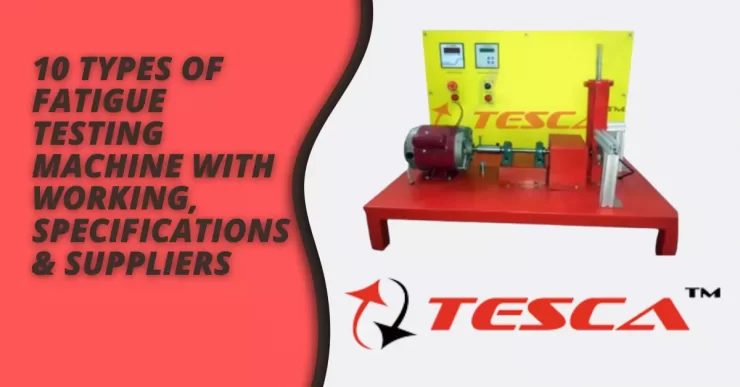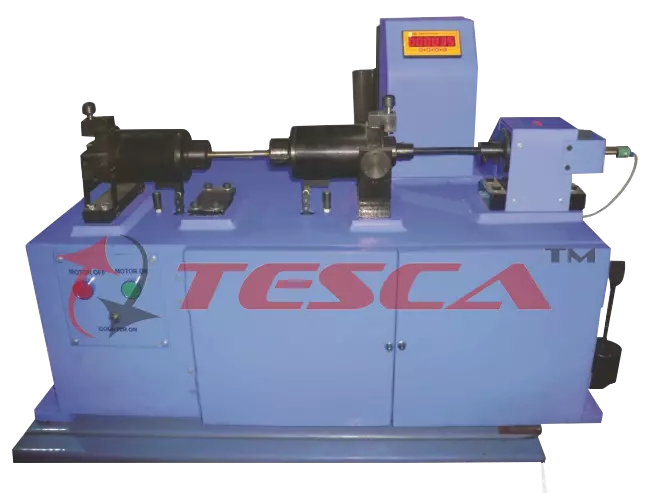Table of Contents
How would one know about raw material, finished product, or component’s sturdiness? Not sure how to find out about it?
Well, there is always a device for it. And the name of the machine is a Fatigue Testing Machine.
Are you not sure what it does? Well, let’s find out:
What is a Fatigue Testing Machine?
A fatigue testing machine is a device to assess the fatigue life of materials. It produces cyclic loads that simulate the conditions of service and measures their effect on a specimen.
It checks the strength of the material under repeated loads and helps predict the final life span of equipment and machinery used in heavy industries like mining, engineering, etc.
Fatigue machine is also known as fatigue test machine, fatigue strength tester, or fatigue tester.
3 Most Common Uses of a Fatigue Testing Machine:
- Fatigue tests are critical in manufacturing because they determine a material’s lifespan. One can conduct fatigue tests in a laboratory setting. Using a machine interface and software, one can load a known amount of weight down onto the samples to see how much stress can be placed on them before they break.
- Fatigue testing machines use high frequency dynamic and static loading to evaluate the sturdiness of articles by applying force over many cycles until failure.
- In short, machines subject these materials to thousands of repetitions of just about any type of stress one can give them until they break.
Fatigue Testing Machine Working Explained:
Let us understand how the device works here:
- Fatigue Testing is a non-destructive test, performed to check the strength of a material under different load conditions and find out the maximum number of cycles it can withstand before failure. The device tests the Sample material by applying tension and measuring the resulting elongation. The test specimen is supported at one end and attached to a tensile testing machine which uses the force necessary to produce the desired extension.
- To perform a fatigue test, we need to use a device created to generate and sustain extremely high levels of stress on different materials. This machine can take many shapes and sizes depending on its use.
- However, one of its most crucial components remains that it has to withstand high-stress levels without breaking or falling repeatedly. When testing for fatigue, for example, the machine needs to predict whether a material (such as metal) will be able to withstand prolonged exposure to extremely high levels of stress.
- It’s essential that they’re able to sustain these levels and that they’re still functioning correctly at the end of each cycle to give us an accurate visual analysis regarding how much time before their functionality expires.
- These experiments help us determine the peak load the material may experience in everyday life or during use in the manufacturing environment – which is crucial for determining if the product will make it through its lifetime.
Read also: What Is Hydraulic System and How Does it Work?
10 Different Types of Fatigue Testing Machines:
When we talk about the different types of fatigue testing machines, three types are the most common forms of this machine: Strain Control, Low Cycle Fatigue, and load control high cycle fatigue.
Strain Control:
Strain control is a process of controlling the load on an object. It ensures the strain in a component does not exceed the specified value. It refers to controlling the strains within allowable limits and maintaining the controlled strains for long periods.
Low Cycle Fatigue:
Low cycle fatigue involves applying stress of low levels on an object to reduce its fatigue strength. It is a type of fatigue that occurs due to the large plastic strains that occur before the failure under the load number of the load cycle.
Load Control High Cycle Fatigue:
Load control high cycle fatigue is when the load applied to an object is changed very quickly and frequently. High cycle fatigue is when a material breaks down due to repeated loading.
Apart from that, there are several other types of devices. Let us know more about it here:
1. Wheel Disk-Hub Fatigue Test Machine:
A wheel disk-hub fatigue test machine is a piece of unique machinery that is valuable in carrying out the fatigue strength test of steel wheels.
It is a non-contact fatigue testing machine used to test the wheel disk hubs’ fatigue life.
It examines the fatigue life and load capacity of wheel disk- hub under different loads, speeds, and temperature scope.
It carries out the wheel disk-hub fatigue test of vehicles under running conditions.
It is widely popular for examination and testing vehicle components such as shock absorbers, steering wheels, front wheels, etc.
2. Dynamic Fatigue Testing Machine:
A dynamic fatigue testing machine tests the dynamic load-carrying capacity of a component or assembly.
It is helpful to determine the strength of a piece exposed to repeated stress, such as impact and vibration. The test configuration and loading condition are necessary for the component’s fatigue life.
Dynamic fatigue machines may be linear or rotary, depending on the applied dynamic load.
3. Rotary Bending Fatigue Testing Machine (Rotating):
A rotating-beam fatigue testing machine facilitates testing of materials to generate the S-N curve from which one can determine endurance limit.
It uses beams to conduct stress tests and other types of mechanical testing. These beams rotate several times and attach shafts at opposing ends with a clamped workpiece placed in the center.
The rotating beam fatigue testing machine is a similar apparatus but serves a different purpose.
The beam or equivalent device turns until one end inevitably fails due to excessive vibration, stress, or other damaging force.
This technique is frequently employed when conducting tensile tests to determine materials strength or elastic limits.
4. Servo Hydraulic Fatigue Testing Machine:
A servohydraulic fatigue testing machine tests the strength of the material in a controlled environment.
It applies stress to certain parts of the specimen until it breaks and then measures the load at which it broke using some force transducer.
It helps test cyclic loads or static loads, and this data is valuable in calculating parameters such as ultimate load, yield point, or percent elongation.
These machines are popular to test various metallic and non-metallic materials while being put under pressure.
Tension, compression, flexural, and bending tests are all sample methods used to ensure proper quality control when the time comes to create or improve products.
5. Zipper Reciprocating Fatigue Testing Machine:
A reciprocating fatigue testing machine helps determine the fatigue strength of high cycle fatigue, low cycle fatigue, or cyclic-tensile materials.
It can help test the toughness of metal parts and the fatigue life of metal and composite laminates, adhesive joints, and other materials subjected to cyclic stresses.
The RFT applies a repeated load using a controlled stroke length at a specified frequency. The device simulates the fatigue process. It helps determine the life expectancy of metal parts under repeated load.
6. Spring Fatigue Testing Machine
Spring Fatigue Test Machines measure and determine the spring life and fatigue strength. The test results are practically helpful in assessing the quality and making maintenance decisions.
Spring Fatigue Test machines are primarily valuable in metallurgical industries, including high-performance springs found in cars, aircraft, industrial machinery, and military equipment.
It is excellent and reliable equipment for the testing of spring materials. The fatiguing tests help determine the working life, maximum stress, and residual strength of springs. They are helpful for monotonic tension and compression-based mechanical tests.
7. Axial Fatigue Testing Machine:
Axial fatigue testing machine helps determine the fatigue strength of materials. In this test, the load that applies along the sample axis then compares results to similar samples subjected to various levels of cyclic loading (i.e., a known number of cycles).
It tests the durability and strength of machine parts like shafts, gears, etc., that have metal on metal contact.
It also tests the ability of a material to withstand repeated stress in the same plane.
8. Torsional Fatigue Testing Machine:
Torsional fatigue testing machines are valuable in prompting real-life service requirements and checking product grade for products such as drill device bit tips and medical appliances, wire, screws and other fasteners, and much more.
It can avoid the influence of other factors on testing and obtain a more accurate result. The main feature is that it can test two sides of the same sample simultaneously by using a high-precision electric system and control system, which greatly shortens the time for loading and unloading samples and reduces labor intensity.
It performs a torsion test on a material sample after being subjected to a specified level of cyclic loading.
9. Radial Fatigue Testing Machine:
Radial fatigue testing is a non-destructive technology that effectively evaluates the material’s mechanical properties under test.
Results are a reflection of the inner and outer structure and surface conditions. It is an electrically driven fatigue testing machine that simulates the load forces that a wheel experiences while cornering on the road.
It uses a horizontally moving carriage to create radial and tangential stress, replicating stresses during use.
10. Cyclic Fatigue Testing Machine:
A cyclic fatigue testing machine tests the durability of various materials. A material that fails in cyclic testing is unsuitable as an engineering material, as it will fall under repeated stress (repeated loading and unloading).
Cyclic fatigue machines are useful in performing fatigue testing on a product. It is valuable to produce many cycles, and it is usually helpful in combination with another type of mechanical testing equipment.
It tests the durability of machinery and materials based on their resistance to repeated loads.
Read also: Cochran Boiler: Application, Working, Main Parts Advantages
Fatigue Testing Machine: Specifications
Some of the specifications of a Fatigue Testing machine are:
- These machines come with a ‘digit display counter’ and a mechanical counter that one can for an additional cost.
- Devices with maximum bending moment up to 400 Kg-cm are available upon request. Most of these models are table-mounted and do not require a partial foundation. Most pieces of machinery have a simple lever system for changing the load depending on your requirements.
- It uses a lever system for quickly changing the force when required, and each machine comes with simple instructions for operation.
- It contains a lad cell. The load cell is a device for measuring the pressure applied to it. It consists of an aluminum or steel strain gauge bonded to a thick metal plate, bolted onto a machine’s moving part.
- According to the usage purposes, these machines have a tension tester, bending tester, and so on.
- It is useful for each kind of wire rope, chain, or other metal products such as rod, bar, tube, shaft, etc.
Expected Price of a Fatigue Testing Machine:
Many reputed companies around the globe manufacture fatigue testing machines, which is why these machines are available in different price ranges.
The price range of this machine starts from INR 50,000 to INR 2.5 lakhs as per the brand and feature that the product offers.
Fatigue Testing Machine Supplier and Manufacturers:
Understanding the mechanics of a product’s strength and durability is the first step toward ensuring the success of a finished product. That is why it is necessary to purchase relevant devices from a certified manufacturer of fatigue testing machines such as Tesca Global.
Tesca Global is a professional supplier and manufacturer of material testing machinery, including fatigue testing machines, universal testing machines, impact testers, hardness testers, woodworking machinery.
We can design and develop customized equipment according to your requirements. Everything starts from producing the components by using the most advanced equipment and skilled employees.
The machine molds the raw materials into the final products through many processing steps.
Some of the specifications that Tesca Global’s fatigue testing machines offers are:
- Tesca’s fatigue testing machine can simulate the aging and corrosion of products to test the fatigue strength of products in a different environment.
- Tesca’s fatigue testing machines are known for having a user-friendly interface and being easy to operate. Its high capacity, accuracy, stability, and reliability are featured.
- Tesca’s fatigue testing machine includes the world’s most advanced technology and can test the fatigue strength of different parts at different loads and temperatures.
- It can test various equipment and components under high-load fatigue conditions.
- Tesca fatigue testing machines help customers maintain and improve the quality of their products, and they enable users to easily do life simulations, endurance, and other tests.
Tesca is a brand that has been manufacturing and supplying the best solutions for workshops for many years from a network of local and global suppliers. Get the most suitable fatigue testing machine for your workshop with Tesca Global.
Know more about Laboratory Equipment Manufacturers: Tesca Global






Add comment